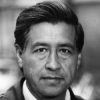Cesar Chavez

Cesar Chavez
Cesar Chavezwas an American labor leader and civil rights activist who, with Dolores Huerta, co-founded the National Farm Workers Associationin 1962. Originally a Mexican American farm worker, Chavez became the best known Latino American civil rights activist, and was strongly promoted by the American labor movement, which was eager to enroll Hispanic members. His public-relations approach to unionism and aggressive but nonviolent tactics made the farm workers' struggle a moral cause with nationwide support. By the late 1970s, his tactics...
NationalityAmerican
ProfessionCivil Rights Leader
Date of Birth31 March 1927
CityYuma, AZ
CountryUnited States of America
When you sacrifice, you force others to sacrifice. It's an extremely powerful weapon.
We have suffered unnumbered ills and crimes in the name of the Law of the Land. Our men, women and children have suffered not only the basic brutality of stoop labor, and the most obvious injustices of the system; they have also suffered the desperation of knowing that the system caters to the greed of callous men and not to our needs. Now we will suffer for the purpose of ending the poverty, the misery, and the injustice, with the hope that our children will not be exploited as we have been. They have imposed hungers on us, and now we hunger for justice.
It's amazing how people can get so excited about a rocket to the moon and not give a damn about smog, oil leaks, the devastation of the environment with pesticides, hunger, disease. When the poor share some of the power that the affluent now monopolize, we will give a damn.
Perhaps we can bring the day when children will learn from their earliest days that being fully man and fully woman means to give one's life to the liberation of the brother [and sister] who suffers. It is up to each one of us. It won't happen unless we decide to use our lives to show the way.
You cannot uneducate the person who has learned to read.
The people who give you their food give you their heart.
Grant me courage to serve others; For in service there is true life.
It is not good enough to know why we are oppressed and by whom. We must join the struggle for what is right and just. Jesus does not promise that it will be an easy way to live life and His own life certainly points in a hard direction; but it does promise that we will be "satisfied" (not stuffed; but satisfied). He promises that by giving life we will find life - full, meaningful life as God meant it.
We cannot seek achievement for ourselves and forget about progress and prosperity for our community... Our ambitions must be broad enough to include the aspirations and needs of others, for their sakes and for our own.
Preservation of one's own culture does not require contempt or disrespect for other cultures.
I'm not going to ask for anything unless the workers want it. If they want it, they'll ask for it.
Kindness and compassion toward all living things is the mark of a civilized society.
True wealth is not measured in money or status or power. It is measured in the legacy we leave behind for those we love and those we inspire.
History will judge societies and governments — and their institutions — not by how big they are or how well they serve the rich and the powerful, but by how effectively they respond to the needs of the poor and the helpless.